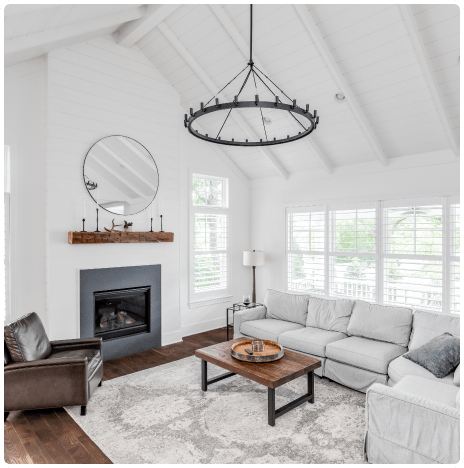Home Insurance Toronto

Leading Home Insurance Brokers Serving Toronto
Are you seeking Toronto home insurance? Whether you own a single-family home or a townhouse, it’s crucial to make informed decisions for your valuable investment.
At Sharp Insurance, our home insurance brokers in Toronto assist residents in finding the best and most affordable home insurance options.
With Toronto being a diverse and vibrant city, our brokers understand the unique needs of homeowners in this bustling metropolis. We work closely with you to tailor your home insurance coverage to match the specific risks and requirements associated with living in Toronto. Whether you’re in the heart of downtown or in the surrounding suburbs, our brokers are dedicated to providing you with the protection and peace of mind you deserve.
Other Insurance Products we provide in Toronto:
Is Home Insurance Mandatory in Toronto?
It’s not mandatory to buy home insurance in Toronto, unlike auto insurance, but it’s a necessity. If there is a fire or flood, you will need money to replace your home and all its contents.
Why take the risk of losing everything? If you apply for a mortgage, the lender will require you to buy an insurance policy, so be prepared to discuss the coverage you want for your home insurance policy. Our brokers will guide you to make the right choices.
Looking for condo, or tenant insurance in Toronto? Look no further. Sharp Insurance has got you covered for different types of property insurance. Simply use the links below to request best quotes and secure the insurance that fits your needs perfectly.
Get a Quote

5 Top Reasons Why You Should Buy Home Insurance in Toronto:
- Your mortgage lender will request you to have Toronto home insurance coverage.
- Insufficient funds to replace or rebuild your home and contents.
- You don’t have to pay a lawyer if you get sued by someone hurt in your home or if a visitor’s contents were damaged.
- You require additional living expenses after a disaster.
- Peace of mind when a loss occurs.
Average Home Insurance Cost in Toronto
On average, home insurance rates in Toronto cost $1,272 annually, or $106 per month — the fifth highest rate in Ontario.

Why Sharp Insurance is the top choice for home insurance Quotes in Toronto?
Sharp Insurance, a Calgary-based and award-winning insurance brokerage, is also a leading choice for home insurance in Toronto. Our exceptional services extend to the vibrant city of Toronto, where thousands of clients trust us to secure the most fitting coverage for their needs. Here’s why Sharp Insurance is the top choice for home insurance Quotes in Toronto.

What’s Covered under my Toronto Homeowner’s Insurance Policy?
There are many insured perils, or events, covered under a home insurance policy in Toronto designed to protect your home, including the building and its contents. Peril is the cause of personal injury or property damage, and the cause of loss.
Peril refers to an event which causes property damage or loss. Here are some common perils, some of which you may not be covered for.
12 common insured perils you’ll find in a standard Toronto home insurance policy:
- Fire
- Smoke
- Explosion
- Lightning
- Electrical current
- Wind
- Hail
- Falling object
- Weight of snow (roof collapse)
- Impact of car or plane
- Vandalism, theft, riot, other malicious acts
- Water damage (depending on your policy)
Toronto Home Insurance
Your home insurance protects your residence, or the structure of your home. It also covers outbuildings, like a detached garage or shed. In the case of a fire, explosion or other damage to your house, your insurance can pay for the repairs or reconstruction.
Your policy should provide enough coverage to rebuild your entire home, which is known as the replacement cost. It refers to the value that your property would be worth if it were rebuilt. This value differs from its market value.
Insurance companies in Toronto can help estimate the value of your property by asking you for information about it, including the age, square footage and type of materials used.
You may be considering home improvement projects such as basement renovations, kitchen remodeling, etc., all these should be reported to your insurer as soon as you can so that the coverage of your home policy can be changed.
If you don’t inform your insurance provider in advance, they may deny the claim when it’s most needed.
You don’t want your home to be underinsured. It’s important that you answer the questions in your application as accurately as possible.
For an additional cost, some providers offer guaranteed replacement cost coverage. This ensures that you will receive the full value of your house, regardless of the policy limit.
This is a great option for peace of mind. You’ll know that you can rebuild your home if something goes wrong.
Liability Coverage
Your home insurance liability coverage pays expenses resulting from a claim for bodily harm or property damage to third parties, subject to the stated limits.
There is no minimum liability insurance requirement in Canada because home insurance is not mandatory.
It is suggested that your personal liability limit be at least $1,000,000, as a small lawsuit could cause you to face serious financial problems. Most of the time, raising your policy limit won’t have a significant impact on your premium.
You should also be aware that insurance coverage does not cover injuries suffered by household members.
Personal Property
This part of the home insurance policy is also known as contents insurance. It covers personal belongings, meaning you will be reimbursed for any costs incurred to replace or repair them if they are damaged or lost due to an event covered by your plan.
Furniture, electronics, clothes and appliances are all covered. The coverage is also extended to items that you take on vacation if they are covered in your home insurance policy. So, if your laptop was stolen out of your car, your home insurance may cover it.
You can calculate how much coverage you require by making a list of all your belongings, grouped according to room then add the cost to replace them.
You should update your insurance coverage frequently (and particularly when you buy a costly item). Otherwise, you could find yourself underinsured in a crisis.
Not all home insurance policies cover the replacement value of your possessions. Some insurance policies will pay you the actual cash value for your belongings, rather than the original purchase price.
Although actual cash value insurance is cheaper, you should be comfortable with the terms before you decide to go this route.
Keep in mind that some items such as jewelry and artwork are insured only up to the limit specified in your insurance policy. Consider adding an endorsement to the policy to increase coverage for these items.
Additional Living Expenses
Additional living expenses are covered as part of your home insurance. Your home may become unlivable because of an insured event.
If your house is completely intact but you are forced to leave due to an evacuation order or a danger in the neighborhood, your policy will still cover additional expenses.
You’ll still be responsible for paying your regular, ongoing expenses, such as mortgage, insurance, groceries, etc., since these aren’t increased costs, you’re facing due to the loss of your home.
The addition of living expenses can also be used to protect rental income. Your insurance may pay the rental value if you rent out part of your house and your tenants can’t live in it due to an event covered by your policy.
Some of the best insurance companies in Toronto include these coverages in a standard comprehensive home insurance package.
Some of the best home insurance companies in Toronto include these coverages in standard comprehensive home insurance packages. If you feel like you need more coverage, consider increasing your coverage limits by adding endorsements.
Read through your insurance policy carefully and clarify any terms with your insurer or broker as they may differ depending on your insurance company.
3 Common Home Insurance Endorsements in Toronto
What Are the Common Types of Home Insurance?
You’ll be happy you took the time to compare home insurance policies to find the best one to suit your needs. Choose your home insurance policy wisely, as it will provide protection for your home and your personal items.
Basic Home Insurance
A standard home insurance policy includes protection for your home, its belongings and you (personal liability). Below are two main basic coverages that your insurer will offer.
Comprehensive Insurance
The most protection provided for your property and contents for all risks, except the risks that are specifically excluded.
Broad Insurance
This covers only named perils protection for contents and a comprehensive list of perils for your home.
Some insurers also offer a “no frills” policy and a basic (named perils) policy. A “no frills” policy is coverage for homes that do not meet the requirements for a standard home policy. For example, if the home has physical damage. A basic policy only covers perils that are specifically stated in your home insurance policy.
Get a Quote

What is Not covered by Toronto Home Insurance?
As a homeowner, there are different levels of home insurance available, and a basic comprehensive policy will exclude certain events. Your insurer will not cover you for these uninsured activities, or exclusions.
Keep in mind a few uninsured activities below:
- Wear and tear
- Mould
- Water damage from frozen plumbing (the homeowner is away)
- Harm caused by insects, vermin and animals.
- Damage to your home after leaving it intentionally vacant for 30 consecutive days.
- War, terrorism or nuclear incidents
- A homeowner’s illegal activities
What Factors Impact your Toronto Home Insurance Premiums?
While you want the cheapest home insurance Quotes in Toronto, your home insurance premium depends on many factors, including:
What are Insurance Costs for Different Types of Homes in Toronto?
You may already own a condo and you’re looking to upgrade to a townhome. Or, you’re buying your first place and you have questions about the price and coverage of a single-family home. The cost of home insurance will factor in what type of home you choose to buy, among other factors.
What are Loss Settlement Options for Home Insurance in Toronto?
Imagine the unexpected happening; your home is damaged during a fire. You expect certain items in your home to be covered by your insurance policy. But your insurer will only cover a portion of the cost of certain personal items, such as antiques and jewelry. You may have to pay out of pocket for the difference. Why? When your insurance policy is set, you must agree to certain limits on personal items, which determine how much money you’ll get back in the event of a loss. These limits are called your loss settlement options.
Did You Know?
If you’re away from your home for more than four days in the colder months (with no one checking in), and you have water damage from a pipe burst, you won’t be covered by your insurance company? It’s a clever idea to go over the details of your policy at the beginning with your insurance agent, so you don’t get left with a huge bill.
Did You Know?
If you’re away from your home for more than four days in the colder months (with no one checking in), and you have water damage from a pipe burst, you won’t be covered by your insurance company? It’s a clever idea to go over the details of your policy at the beginning with your insurance agent, so you don’t get left with a huge bill.
Loss Settlement Options
Agreed value
The agreed upon value of an item or property. This option is used for special items, such as jewelry, antiques or a heritage home.
Actual cash value, or market value
This option includes the purchase price of your home, minus the depreciation. This is not the price you bought your home at but rather the current value of your home.
Replacement cost
The total cost of replacing your home after a loss, without considering the depreciation.
How Do I Get Discounts on my Home Insurance Policy in Toronto?
There are many discounts you could be eligible for under your home insurance policy; some are more common than others. Ask one of our Toronto, Ontario insurance brokers for details specific to your assets.

How to Get Cheap Home Insurance in Toronto
- Compare home insurance quotes and shop around: By entering your information, Sharp insurance can provide you with multiple home insurance quotes from Canada’s top providers in minutes.
- Bundle policies: Most of Toronto’s home insurance companies offer a discount of 20–25% to customers who purchase both Toronto home and auto insurance.
- Maintain a good credit score: Pay your bills promptly if your insurance company monitors your score to save on home insurance cost. Sign up for a credit-monitoring service and learn about how to achieve the highest possible credit score.
- Increase your deductible: Your premiums will be reduced if you increase your Toronto homeowner’s insurance deductible. You should make sure that you are able to afford the increased deductible in case you must file a claim.
- Preventive renovations: You could reduce your insurance premiums by upgrading known risks such as changing plumbing materials from steel and iron to plastic and copper. If you add an expensive finish or build a new addition, you will likely have to pay more.
- Look for discount opportunities: New jobs may bring with them union memberships, corporate discounts or group discounts. Retirees may be able to save money on their home insurance. It’s recommended that you review your policy annually to determine what discounts are available to you.
- Install alarm systems with monitors: You could get a discount of 5–10% on your house insurance in Toronto if you install a system that is centrally monitored. This usually excludes cameras or motion sensors.
How Do I Make a Home Insurance Claim in Toronto?
There are several steps to take when you’re hit with a loss. Most insurance companies have the same procedure, but it varies slightly from one insurer to the next.
- An event (storm, water damage, etc.) or loss can be stressful. Take your time to decide on your next steps.
- Contact your insurance company or broker by phone or online. Have your key insurance documents on-hand.
- Your claim will be assessed by the claims department and a claim adjuster
- If you can, document the damage (photos, videos, etc.)
- If your property needs a clean-up, let your insurance company know as you may be covered.
- After an adjuster visits your home, a claim estimate will be recorded with your insurer.
- A settlement value will be determined from your inventory list.
- Hire a contractor or have your insurer contact one for you.
- Sign forms to finalize the repair work and final claim estimate.

Before you call your insurance company to file a claim, consider these tips:
- When you file a claim, you must pay your deductible before the required work is completed.
- In some cases, you’re better off paying for the loss yourself. For example, if you can pay out-of-pocket for the damages — this will keep your insurance rates from rising. If the damage is too expensive, such as hail damage to your roof, then it may benefit you to file a claim.
- You may not be covered for a loss related to maintenance or upkeep of your home, such as mould or water leaks.
- Your insurance claims may follow you for 5–7 years, even if you change your home insurance policy to another property.
- You could lose your claims-free discount on your homeowner’s policy. Instead consider paying out of your own funds.
- Your home insurance claim could be denied. Think of alternatives to making a claim.
Explore more:
Did you know?
If you have a high number of insurance claims, your deductible could increase, your coverage could be removed or in the worst-case scenario your policy could be revoked. If all else fails and your claim is denied, you can appeal your claim or seek legal advice.
Did you know?
If you have a high number of insurance claims, your deductible could increase, your coverage could be removed or in the worst-case scenario your policy could be revoked. If all else fails and your claim is denied, you can appeal your claim or seek legal advice.
Why Does Personal Inventory Matter for Toronto Home Insurance?
It takes time and effort to assemble a list of everything of value in your household, but it’s worth it in case of a loss. If you do have an unfortunate incident or a sudden loss, you’ll be prepared.
Here a few tips to create a personal inventory list:
- Make a list of what’s in each room in your home, and give it a dollar amount
- Save and organize your receipts for big ticket items
- Take photos or videos of the items you want coverage for
- Estimate the total value of your household items
- Update your inventory every year
What Is a High-Risk Home Insurance Policy in Toronto
A high-risk insurance policy is offered to policyholders who have a specific risk for their home not covered under a standard home insurance policy.
8 Property Insurance Risks:
- Older homes
- Rental homes
- Missed payments
- Multiple claims
- Gaps in home insurance coverage or no prior home insurance
- Vacant homes
- Rural properties
- Student housing
At Sharp Insurance, it’s easy to contact one of our high-risk home insurance brokers in Toronto to get details on each insurance risk that you qualify for.
What Does Sharp Insurance offer its customers?
Sharp Insurance goes beyond offering a good service and provides exceptional customer experience. Our digital options, including our app and web portal, push us ahead of the competition. My Sharp App allows you to access your policy details, claim information and instantly pull up your pink card on your phone — without the hassle of searching in the glove compartment or having to call your insurer.
We offer:
- Competitive home insurance quotes in Toronto
- Partnerships with many of the best insurance companies, including Intact
- Services of an independent brokerage
- We work for you
- Digital options that make the insurance process easier
- Brokers that are your trusted advisors
- The best insurance brokers in Toronto, Ontario
FAQs: Toronto Home Insurance
A policy limit is the maximum dollar amount you’ll receive from your insurance company if you suffer a loss from a covered claim. Depending on your policy, limit amounts will range for both your belongings and your home.
In Toronto, the best home insurance agents can help you set appropriate home limits that make sense for your budget and lifestyle.
A deductible is the set amount a homeowner pays their insurer after a loss. The amount is pre-determined by the homeowner’s policy and must be paid out before a policyholder can be compensated for a claim. The deductible dollar amount will be found on your insurance policy statement.
There is a range of options for home insurance deductibles, ranging from $500– $1,500 with $1,000 being the most common deductible amount for policyholders. A higher deductible amount will typically lower your home insurance premiums and save you money in the long run.
